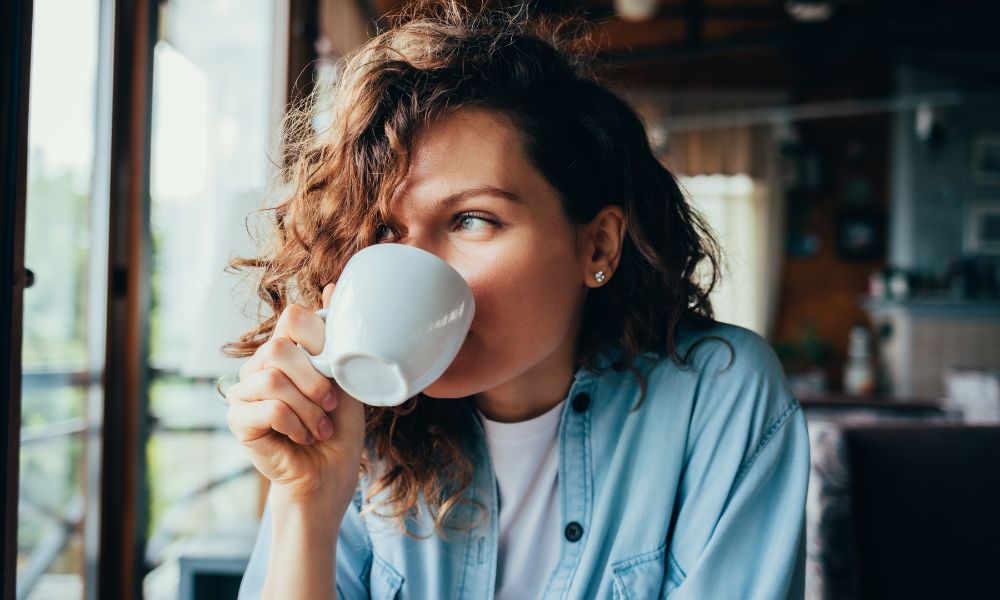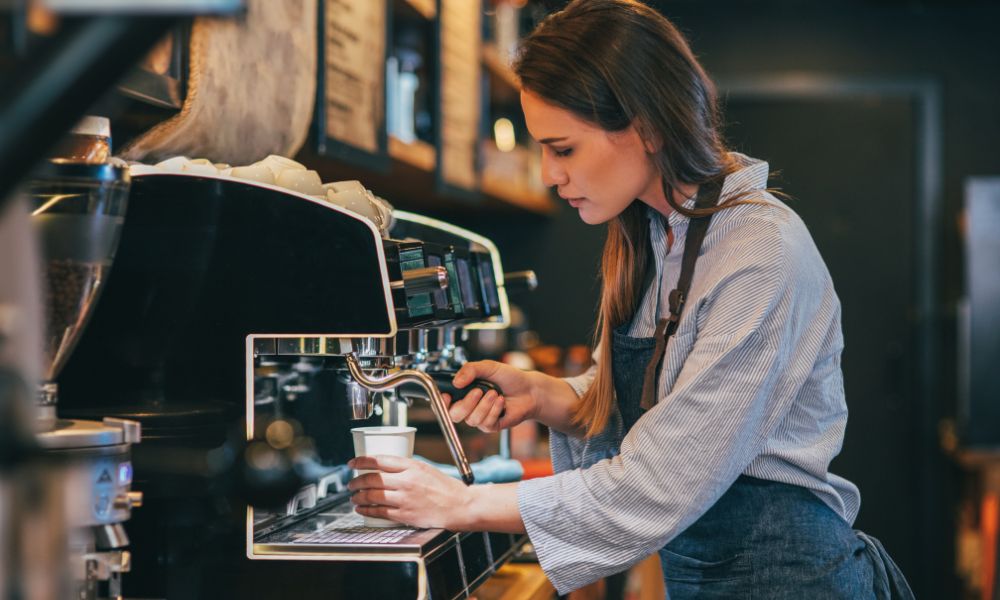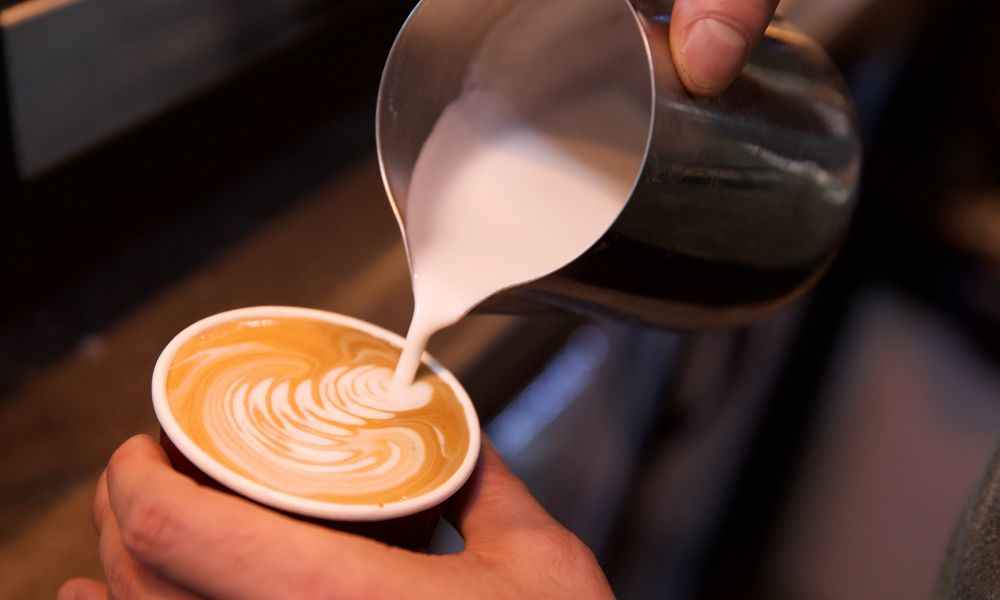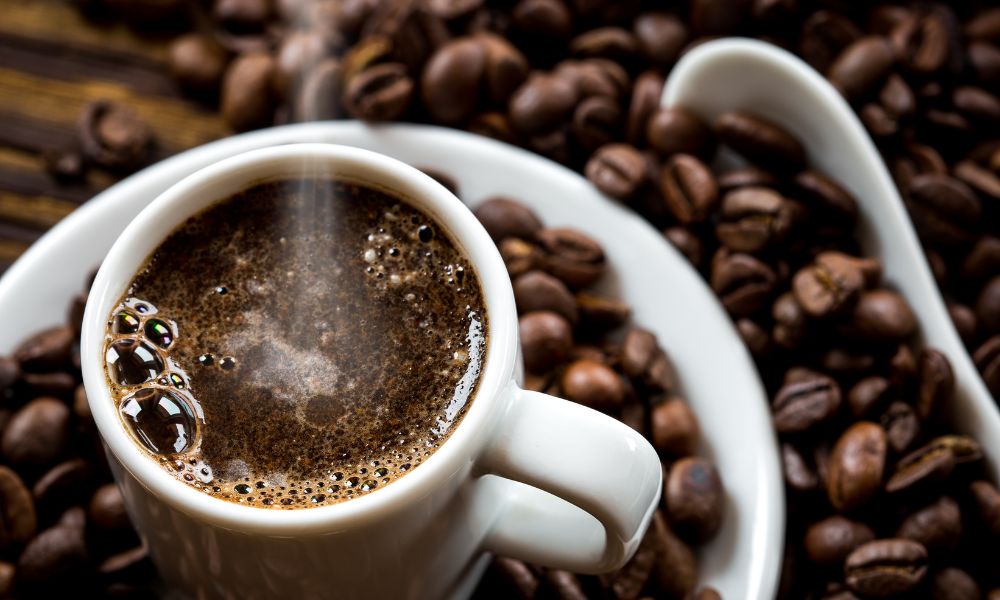How hot is coffee supposed to be served? Find out the facts according to science with this guide that breaks down everything you need to know.

Coffee is one of the most popular drinks in the world and there are many ways to prepare it. The temperature at which coffee is served can have a big impact on the taste and quality of the drink.
So, how hot is coffee supposed to be served? The answer may surprise you.
According to a scientific study published in Burns Journal, the perfect temperature for serving coffee without any risk of burn is 136 °F (57.8 °C). This temperature will give you the best balance between burn safety and flavor.
However, it’s not possible to serve coffee at a defined temperature every time. The optimum temperature range for serving coffee is 130 °F to 140 °F (54.4–60 °C).
Don’t let the numbers confuse you. For one, the preferred drinking temperature will be lower than the serving temperature. Also, there is a difference between serving and brewing temperature, and it’s not certainly suggested as the best-tasting temperature for hot coffees!
The following article discusses these confusions as they come up in detail – so you can better brew your own coffee the same way you would be an experienced barista.
Different Types of Coffee Served Temperature
| Type of Coffee | Average Served Temperature (°F) | Average Served Temperature (°C) |
|---|---|---|
| Espresso | 150°F – 170°F | 65.5°C – 76.6°C |
| Drip Coffee | 140°F – 160°F | 60°C – 71.1°C |
| French Press | 140°F – 160°F | 60°C – 71.1°C |
| Pour Over | 140°F – 160°F | 60°C – 71.1°C |
| Cold Brew | Below Room Temperature | Below 20°C |
Note: Temperatures may vary based on personal preference and serving methods.
☕️ Note: Temperatures may vary based on personal preference and serving methods.
How Temperature Can Impact Your Experience of Drinking Coffee?

If coffee is served too hot, it can become bitter and burnt tasting. On the other hand, if it is not hot enough, the flavors will be muted, and the coffee will lack the characteristic richness that we all love.
But how hot is too hot? Which temperature range allows for the coffee to retain its flavor and aroma while still being hot enough to enjoy?
Let’s take a look at how your coffee may taste at different temperatures, according to science:
180–185 °F: Warming Sensations and Almost No Taste
This is considered too hot for serving coffee. At this temperature, you’ll barely taste anything, and your taste buds may burn.
Some commercial coffee shops serve coffee at this temperature only because they assume it will stay fresh for a while.
155–175 °F: Hot, Less Acidic, Rounded, and Bitter Notes
Most coffee experts recommend serving coffee between 155- and 175 degrees Fahrenheit.
The coffee will taste “hot,” but it is still palatable in this range. In this heat setting, the taste isn’t very strong; you may taste a momentary acidity or bitterness in the beginning.
However, these temperatures bring forth a distinct scent. If it’s a chilly morning or you’re drinking a subpar cup of caffeine, you may drink at this temperature range.
140–150 °F: Lots of Flavor and Warmth
Some argue that even 155°F is too hot for coffee, even though it may seem like a proper temperature to you.
140–150°F is the middle ground for drinking a hot, high-quality ground coffee with a sweeter taste. You’ll taste the coffee’s roast flavor and distinctive bitterness around this temperature range.
Dark roasts and those who like a hot beverage’s warmth should drink their coffee at this temperature.
120–140 °F: More Acidic, Smooth, and Mellower Flavor
120 to 140 degrees, you’ll be able to taste the complete flavor of coffee at its best. Coffee is more acidic and has a sharper flavor.
Your taste buds will experience the complete spectrum of subtle aromas and acidity with each sip, which lasts for a few seconds. Also, under 140 degrees, the coffee is no longer “hot,” but it still feels warm.
This range is especially recommended for a light roast with distinct nuances.
Below 120 °F: “Cool,” Yet Delicious
The coffee is now considered to be “cold.” Heat no longer reaches your tongue. This enables the taste to linger and become perceptible on the tongue.
Many drinkers will try to reheat their cup of coffee when the temperature drops below 120°F. However, reheating coffee alters its flavor profile, therefore we don’t advise doing it.
Instead, once the temperature approaches 100 degrees, you should enjoy it as a cold coffee and even pour over some ice!
So, What’s the Ideal Temperature?
So, you want a conclusion? How hot coffee is supposed to be served for a delicate balance of hot and cold?
The only real takeaway from this discussion may be that your ideal serving temperature for coffee depends on your own taste preferences as long as it is neither lukewarm nor boiling hot.
Sorry to say that you won’t find an answer everyone agrees on.
However, don’t leave disappointed. Here are some general guidelines from us to help you find the perfect temperature for your cup of coffee:
- You would be better off staying in the 155–175 °F range if you like the warm, sweet, rounded, and bitter characteristics of coffee.
- But if you like a cup that is sharper, brighter, and more acidic, aim for a temperature between 120 and 140 °F.
- Finally, though we don’t recommend it, a cup between 180 and 185 °F served right after brewing would be ideal for you if you have an evolutionary bias toward hot beverages.
Our recommendation is that you may serve coffee a bit hotter since it will cool down and the person consuming it can choose when it is ready, so long as you don’t burn the coffee when you boil it. When it’s cold, it’s more difficult to reheat it.
Your Personal Preference Is the Key Here
Of course, the ideal coffee temperature is just a starting point. Your personal preferences will ultimately dictate what temperature is perfect for you.
So, if you like your coffee on the hotter side, go ahead and crank up the heat. If you prefer your coffee on the cooler side, don’t be afraid to let it cool down a bit before you take your first sip.
The perfect cup of coffee is out there waiting for you, and with a little experimentation, you’ll find it in no time.
What Temperature Should Coffee Be Brewed at?

If you’ve come this far, it should be no secret to you that the temperature of your coffee can have a big impact on the coffee flavor. But what many people don’t realize is that the brewing coffee temperature and the serving temperature can be very different.
The serving temperature is the temperature of the coffee when it is finally poured into your cup. This can be anywhere around 120-180 degrees Fahrenheit.
The brewing temperature is the temperature of the water when it comes in contact with the coffee grounds. According to the National Coffee Association of USA, this temperature should be between 195-205 degrees Fahrenheit.
However, brewing coffee is an inexact science, and there are a lot of variables that go into making the perfect cup of coffee.
So, what is the ideal temperature to brew coffee?
The answer is: it depends. On what? The type of coffee, the grind, the brewing method, and the water all play a role in the final brewed coffee.
- Different types of coffee beans require different brewing temperatures. For example, light roast coffee beans are best brewed at a lower temperature than dark roast beans.
- The grind also makes a difference. A finer grind will require a higher brewing temperature, while a coarse grind can be brewed at a lower temperature.
- The type of brewing method also plays a role in the final temperature. A French press will require a different temperature than an espresso machine.
- And finally, the water you use can also affect the final temperature. Hard water will require a higher brewing temperature than soft water.
Unfortunately, there is no one-size-fits-all answer for the ideal coffee brewing temperature. The best way to figure out the ideal temperature for your coffee is to experiment and find what works best for you.
So why is there such a big difference between the brewing temperature and the serving temperature?
It all has to do with the extraction process.
At higher temperatures, the coffee grounds will release more of their oils and flavors into the water. Therefore, brewing at a higher temperature will result in a more flavorful cup of coffee (which is why it’s recommended). However, if the coffee is too hot, it can become bitter and unpleasant while drinking.
On the other hand, brewing at a lower temperature will result in a less flavorful cup of coffee. But the coffee will be less likely to taste bitter.
How to Ensure Preferred Temperature While You Drink Coffee?

From all the discussions, it turns out that the temperature of your brewed coffee can make a big difference in the coffee flavor. And now that you know about the ideal brewing and serving temperature for coffee, it’s time to bring all the knowledge to your coffee table.
How do you make sure your coffee is at your preferred temperature?
Whether you like it piping hot or relatively cool, there are a few things you can do to make sure your coffee is always at your preferred temperature.
While You’re at a Coffee Shop
You may think you’ve no control over the coffee when you’re in a coffee shop outside. But that’s not the case.
Here are a few tips:
- If you like your coffee hot, ask for it to be brewed with boiling hot water.
- If you prefer your coffee to be more on the lukewarm side, request that it be brewed with room-temperature water.
- If you want your coffee to be at a specific temperature, you can always ask the barista to adjust the water temperature to your liking. You can also ask to see the coffee brewing temperature gauge.
- If you’re not sure what temperature you prefer, just drink in as they serve for the first time. Next time you’re there, you’ll know what to ask.
While You’re Brewing at Home
If you’re someone who likes to brew his own coffee in the morning, here are some things you can do:
- Use a thermometer: A thermometer is the best way to ensure that your coffee is at your preferred temperature. Place the thermometer in the coffee pot or mug and wait until it reaches your desired temperature.
- Pay attention to the water temperature: If you like it hot, make sure to use hot water when brewing. Conversely, if you prefer your coffee on the cooler side, use cooler water rather than cooling down later.
- Use a preheated mug: If you’re using a mug, make sure to preheat it before adding the coffee. If you’re using a carafe, do the same. This will help keep the coffee hot.
By following these simple tips, you can make sure your coffee is always at your preferred temperature. So go ahead and enjoy that perfect cup of coffee, just the way you like it.
The Best Way to Keep Coffee Hot

The best way to keep coffee hot is to use a thermal coffee mug or thermos. It’s also called a “thermal carafe “.
These mugs have a double-walled construction with a vacuum seal between the walls. This helps to keep the coffee hot for hours. You can also find mugs with a built-in heating element that will keep your coffee hot all day long.
If you are using a regular coffee mug, you can preheat it by filling it with hot water and letting it sit for a few minutes before adding your coffee. You can also put a lid on your coffee mug to help keep the heat in.
The Fastest Way to Cool Down Hot Coffee
If you’re looking for the fastest way to cool down hot coffee, here are a few methods you can use:
- One way is to pour the hot coffee into a container with a lid and place it in the fridge or freezer for a few minutes. This will help the coffee to cool down quickly.
- Another way to cool hot coffee is to pour it into a cup with ice cubes. This will help to lower the coffee’s temperature quickly.
- If you’re in a hurry, you can also try blowing on the coffee to help cool it down.
- If you find that your coffee is too hot or too cold, add a little bit of milk or cream to adjust the temperature.
The next time you make coffee or order one, be sure to pay attention to the temperature. Everyone’s taste is different, so you’ll have to experiment to find the temperature that suits you best. And once you find that perfect temperature, your taste buds will thank you!
FAQs
How Hot Was the Coffee in The McDonald’s Lawsuit
In the McDonald’s lawsuit, the coffee was determined to be too hot. It was estimated to be between 180 and 190 degrees Fahrenheit and it was determined that this was too hot for consumers.
This lawsuit led to McDonald’s changing their coffee brewing practices, and the company now brews its coffee at a lower temperature.
How Hot Is Coffee Served at Starbucks?
Starbucks coffee is typically served at around 155 degrees Fahrenheit, which is close to the industry standard for coffee. However, this can vary depending on the individual store and the type of coffee being brewed.
Some people find this temperature to be too hot, so Starbucks also offers its coffee at a lower temperature upon request.
How Hot Does Coffee Have to Be to Burn You?
Coffee has to be pretty hot to burn you – around 70 degrees Celsius or 160 degrees Fahrenheit.
At this temperature, it will cause a first-degree burn, which is when the top layer of the skin is damaged. This is hot enough to cause a serious burn in just a few seconds. If you have coffee that is this hot, be careful not to spill it on yourself.